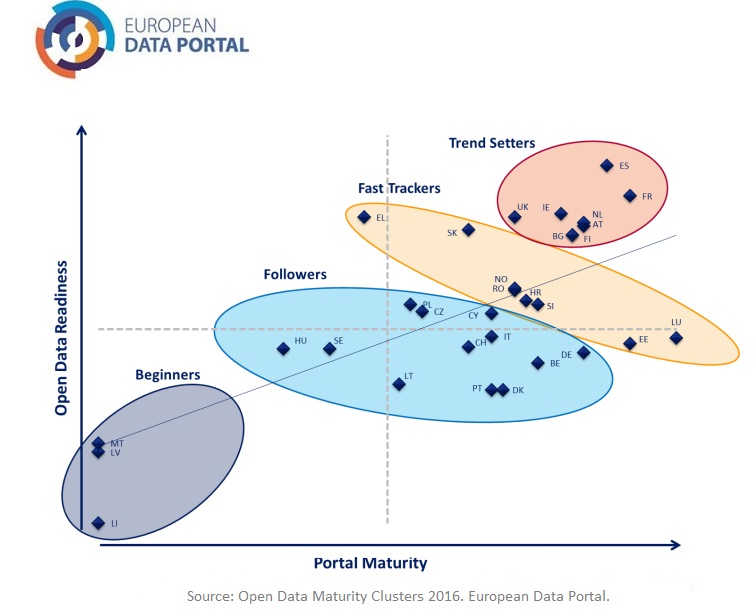The Organization for Economic Co-operation and Development (OECD) has published the results of the second edition of the Open-Useful-Reusable Data Index ( OURData Index), developed to support member countries of this organization in promoting Open data policies.
Spain continues to lead in the development of open data policies, thanks to the work that has been done in the promotion of open data from the public sector and in the strategy focused on open and transparent government. The 2017 OECD index puts Spain in 6th position, behind Korea, France, Japan, Britain and Mexico and ahead of the United States, Canada, Germany and Norway. Specifically, this Open Data OURdata 2017 index (Open Useful Reusable Government Data Index) analyses and measures 140 indicators concerning three fundamental pillars: data availability, accessibility thereof and government support for reuse.
This second edition of the OURData Index has been reinforced by incorporating the principles of the International Open Data Charter, as detailed in the section that describes the methodology . This index is part of the Government at a Glance 2017 report which provides the latest data available on public administrations in the 35 OECD countries and also includes data on Brazil, China, Colombia, Costa Rica, India, Indonesia, Lithuania, Russia and South Africa. In the Open Government chapter, the OECD addresses strategies and objectives in open government, human resource coordination and management, monitoring and evaluation of open government strategies, citizen participation in policymaking, and open government data.
Among other conclusions, it highlights the fact that in 2017 about 50% of the OECD countries (17 of 35 countries) have adopted a national policy of open government. The new OURData Index "shows that countries have made great strides in opening government data using open reusable formats but can do more to encourage reuse among citizens and businesses". In that sense, it points out that the use of new technologies and new approaches, such as those based on behavioural sciences, can help to codify and co-produce services with citizens and improve the effectiveness of public policies.
While recognizing that open public policies are gaining momentum - examples include Hackathons to promote data reuse and training and briefings - this index advocates further evaluation. "Few countries evaluate - it states - whether open government initiatives achieve the desired economic, social, public sector productivity or accountability."
This edition includes new indicators and additional data sources, which allows a wider view of data of public administrations in OECD countries.
The main findings in the OUR Data Index according to the OECD itself are as follows:
- The reuse of Open Government Data (OGD) should be strengthened. Governments have made great efforts to create the formal requirements for dissemination of a large number of data sets in open, non-restrictive and reusable formats. However, few governments have taken an active approach to encourage reuse of data both inside and outside the public sector.
- Delayed implementation of open data policies and practices. Countries such as Czech Republic, Latvia, the Slovak Republic and Slovenia are lagging behind while Canada, France, Korea, the United Kingdom and the United States are pioneers, especially in data availability and accessibility of central data portals.
- Most countries have created public platforms where users can play important role in completing the available data and improving its quality.
- Few countries closely follow the economic and social impact of open data, as well as the impact on productivity and efficiency of the public sector.
The OECD is examining how countries can promote productivity and effectiveness of data reuse policies. With more than 200 indicators in its report, the Organization for Economic Co-operation and Development offers data and ideas with which to understand and compare the policies of each country. Politicians, journalists, academics and the general public can analyse comparative tables by countries in detail and access a clear presentation of the data used to obtain a global overview. More information.
The conclusions of this new edition of the index, regarding the degree of implementation of open data policies in terms of reuse and impact, accessibility and availability, can contribute to the readjustment of public policies in those participating countries. Thus, in the case of Spain, particular emphasis should be placed on aspects related to the availability and accessibility of data, putting the focus on ensuring quality and prioritizing the provision of the data most in demand.
Finally it should be noted how politicians, journalists, academics and the general public can analyse raw data and comparative tables by country in detail, and perform analysis tailored to their needs. More information .
Open data indexes and Barometers are intended to reflect the international ranking of countries in their implementation of open data policies. Although it is practically impossible to measure exactly the level of openness, there are certain initiatives that give an overview of the interest in open data in the different countries of the world. In recent months, some of these indexes have been published, which, although they value different aspects related to open data, have the same purpose. How many global indexes are currently being produced in the world on open data? Do they reflect different realities? What methodology do they employ? What countries are analyzed? In this article we provide a description of the four most important indexes and some of their peculiarities.
Open Data Barometer (ODB) – World Wide Web Foundation
On June 1 the latest Open Data Barometer, prepared annually by the World Wide Web Foundation since 2013, was published. The Open Data Barometer assesses the policies and practices of open data that are being developed by 115 countries worldwide. Specifically, the Web Foundation measures how Governments make their data available to their citizens based on three main sources of information: evaluation questionnaires completed by experts, government self-assessments and other data from international databases.
The ODB analyzes three blocks of indicators aimed at measuring the progress of open data initiatives, implementation of open data programs and impact of open data in business, politics and civil society. It also analyzes the existence and quality of 15 sets of key data at national level (from government budgets, the census, public spending and public transport timetables, to crime statistics, environment or public contracts ...), the data refresh rate, accessibility, possibility of reuse, whether free of charge, type of license, interoperability, and so on. In short, more than 150 researchers and government representatives who make possible the production of a report which includes a set of conclusions on the general state of the open data sector in the world.
Informe anual European Data Portal
On March 4 - World Open Data Day - the European Public Data Portal released its annual report in which it analyzes the level of maturity of the open data ecosystem in Europe. In the second edition of the report, the portal evaluates 31 countries (the 28 members of the European Union plus Norway, Switzerland and Liechtenstein). According to this report, the state of open data across Europe has improved overall but it also highlights significant discrepancies between countries, as well as political, legal and technical barriers.
In order to identify the level of a country's maturity two blocks of indicators are set, aimed at measuring the maturity of open data throughout Europe: the availability of open data and the maturity of data portals. The first assesses a variety of aspects of open data policies in each state and to what extent each country carries out actions to measure the social and economic impact of data reuse. The second analyzes the level of maturity of the open data portals, measures the usability of the platforms, as well as the ease of data reuse and data access.
Global Open Data Index (GODI) – Open Knowledge Foundation
The Global Open Data Index, better known as GODI, is produced by the Open Knowledge Foundation. On 15 June, OKF published its global index of open data for 2017 which analyzes 94 countries and territories in the world. Through this index ten categories of data are analyzed. To measure the openness of these ten data types, Open Data Index bases its rating on responses to a questionnaire that includes questions about the format, openness, update rate or periodicity of publication of the data. The scores for each of these are added to create a final ranking where the level of openness of each national dataset is also displayed. This collaborative initiative is open to any citizen who wants to become a country analyst.
Índice OURData Index – OCDE
The OURData Index (Open, Useful, Government Re-usable Data) analyzes the situation of open data in 28 countries belonging to the OECD (Organization for Economic Co-operation and Development). The OECD OURData Index evaluates the efforts made by governments to implement open data in three critical areas: openness, usability and reuse of government data. The index data comes from member countries and focuses on government efforts to ensure the availability and accessibility of public sector data and to encourage greater reuse. The index is based on OECD methodology and the guidelines of the G8 OGD (Open Goverment Data) Charter. The OECD OGD analysis includes: business information, records, patent and trademark information, public bidding databases, geographic information, legal information, weather information, social data and transport information.
Experts point out that such studies should not be considered an accurate reflection of the real situation, because they are partial analyses selecting specific criteria and metrics, providing an incomplete picture of the open data ecosystem. Nonetheless, such indexes or rankings are useful for interested citizens, civil organizations and groups, and for politicians and data publishers. These rankings are especially helpful for those fields where open data is still an incipient subject.
Spain ranks 11th in open data among a total of 115 countries, according to the latest Open Data Barometer - ODB - which has just been published. Produced on an annual basis by the World Wide Web Foundation since 2013, the Open Data Barometer is a detailed report assessing the open data policies and practices that are being developed by countries around the world. The Barometer analyzes what the governments of 115 countries of the five continents do and do not do regarding open data. To reach its conclusions, the WWW Foundation measures how governments make their data available to their citizens. It does so by using three main sources of information:
- assessment questionnaires completed by experts
- self- assessment by the government
- other data from international databases
Spain has risen continuously since the start of this international ranking, which continues to be led by the United Kingdom, and this last year has climbed two positions - from 13th in 2016 to current 11th - tying with Mexico and ahead of countries like Denmark, Germany, Sweden, Switzerland, Russia or Israel. According to this Barometer, our country is on the verge of forming part of the select club of the world top 10 in openness of data, a movement in which the leaders continue to be United Kingdom, Canada and France - which drops one position -, and which also Includes the United States, Korea, Australia, New Zealand, Japan, the Netherlands and Norway.
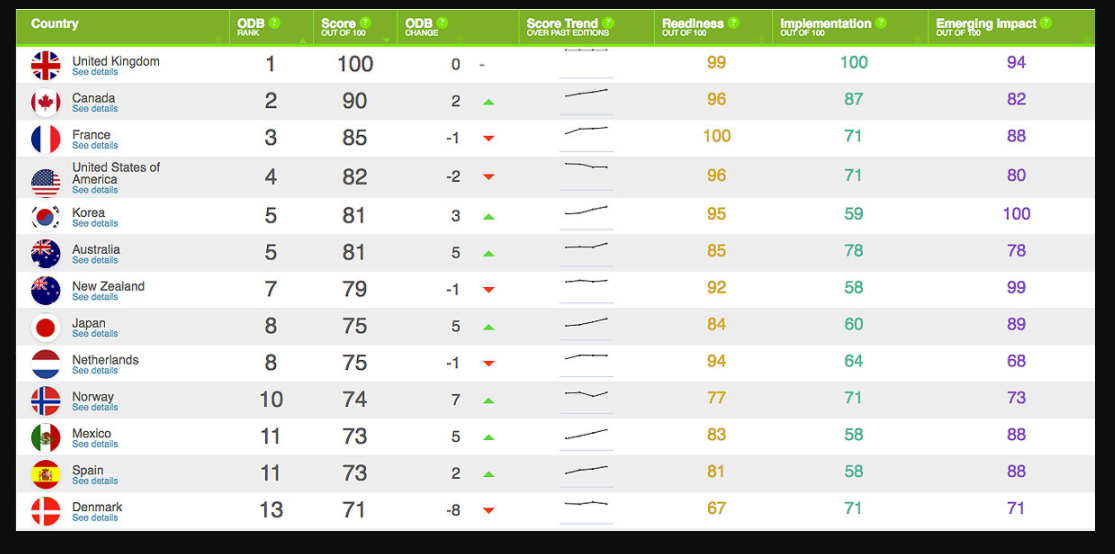
¿What does the Open Data Barometer measure?
The Open Data Barometer aims to determine the scope of open data initiatives around the world. It represents a snapshot of how governments are using open data for accountability, innovation and social impact. To do this, it analyzes global trends and provides comparative data on countries and regions using a methodology that combines contextual data, technical assessments and secondary indicators.
In particular, the ODB classifies governments according to:
- strength of open data initiatives
- implementation of open data programs
- impact of open data on business, politics and civil society.
The Barometer analyzes the existence and quality of 15 key datasets at national level (from land registry to government budgets, detailed census data, public expenditure, public transport schedules, international trade data, primary and secondary education performance, crime statistics, environmental statistics, election results, public contracts ...) in all the countries analyzed. It also details the degree to which data is updated, accessibility, possibility of reuse, whether free of charge, type of license, interoperability, and so on. In total ten indicators relating to 15 different sectors.
The Barometer awards Spain an average of 73 points out of 100, distributed as follows:
- 81 in 'Preparation' (prior disposition of the government, citizens and employers to ensure the benefits of open data)
- 58 in 'Implementation' (accessibility and usability of data)
- 88 in 'Impact' (evidence that openness of data has had some positive impact in the country)
In the Open Data Barometer 2016, these scores were 78 in 'Preparation', 57 in 'Implementation' and 63 in 'Impact'. It is therefore the progress in the "Impact" indicator that has driven the improvement of the position of our country during the last year. The first barometer was made with data from 2013 and since then Spain has made continuous upward progress: from the initial 48 points to the 73.38 points shown in this latest Barometer. This score puts Spain above the continental average but still below countries like Great Britain, Canada or France whose respective scores are 100, 90 and 85 points.
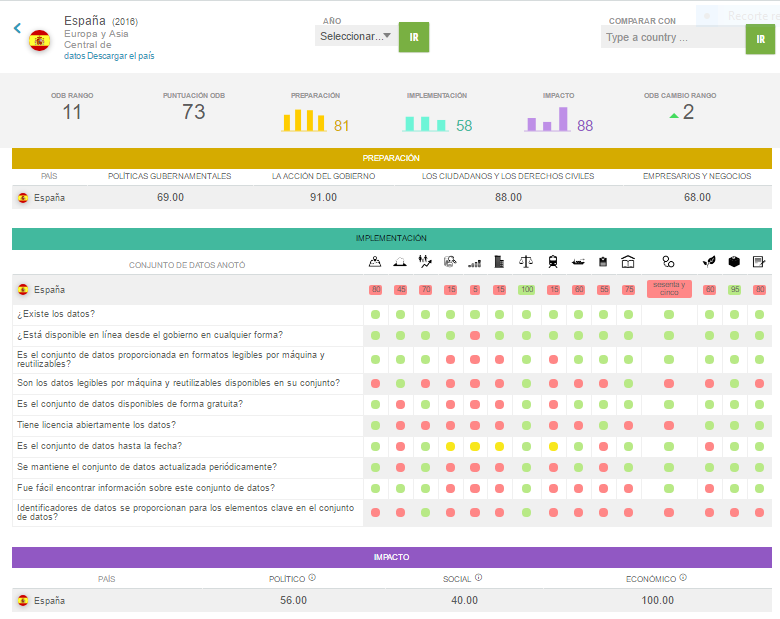
Quality of data versus quantity
"Governments are missing an opportunity to win trust and engage with citizens through open data”. In this report in which it has analyzed 115 countries - 23 of them for the first time - te Web Foundation informs that the top open data leaders are taking certain backward steps in the publication of open data and that 9 out of 10 government datasets are not yet open. Scores from Nordic countries and the United States have fallen this year, and even the United Kingdom, historic leader in open data, has seen troubling changes in key policies.
Open data is data that is available for citizens, companies and institutions to use and reuse. Faced with the current global crisis of confidence, governments have in data openness an opportunity to engage with citizens and regain their trust. The report finds that data on key accountability metrics - such as public spending, public procurement, corporate ownership and land ownership - are among the least open, and often are not quality data. For example, government expenditure data - which helps people understand what their taxes are invested in - are open in only 3% of countries.
Recommendations
Is there a true culture of open data in Spain? Several experts in our country point out that "there is still a way to go" and that "there is still a need to create greater awareness of civil society and to carry out an evangelizing function" in order to increase knowledge of the use of open data and to stimulate demand. The coordinator of the Barometer and expert in the matter, Carlos Iglesias, points out that there are still gaps to be overcome and features to be implemented. For its part, Access Info Europe - a pro-transparency organization that is committed to greater access to public information - emphasizes one requirement above the rest: a boost in administrative education.
Finally, the Open Data Barometer itself, in its conclusions section, makes five general recommendations for a more efficient and effective management of open data:
- Government data must be open by default.
- Governments should decentralize open data across all departments and agencies.
- Governments should adopt the Open Data Charter to ensure that open data practices are integrated above and beyond political mandates.
- Governments should consult with citizens and intermediaries regarding what data to publish first.
- Governments should invest in using open data to improve the lives of marginalized groups.
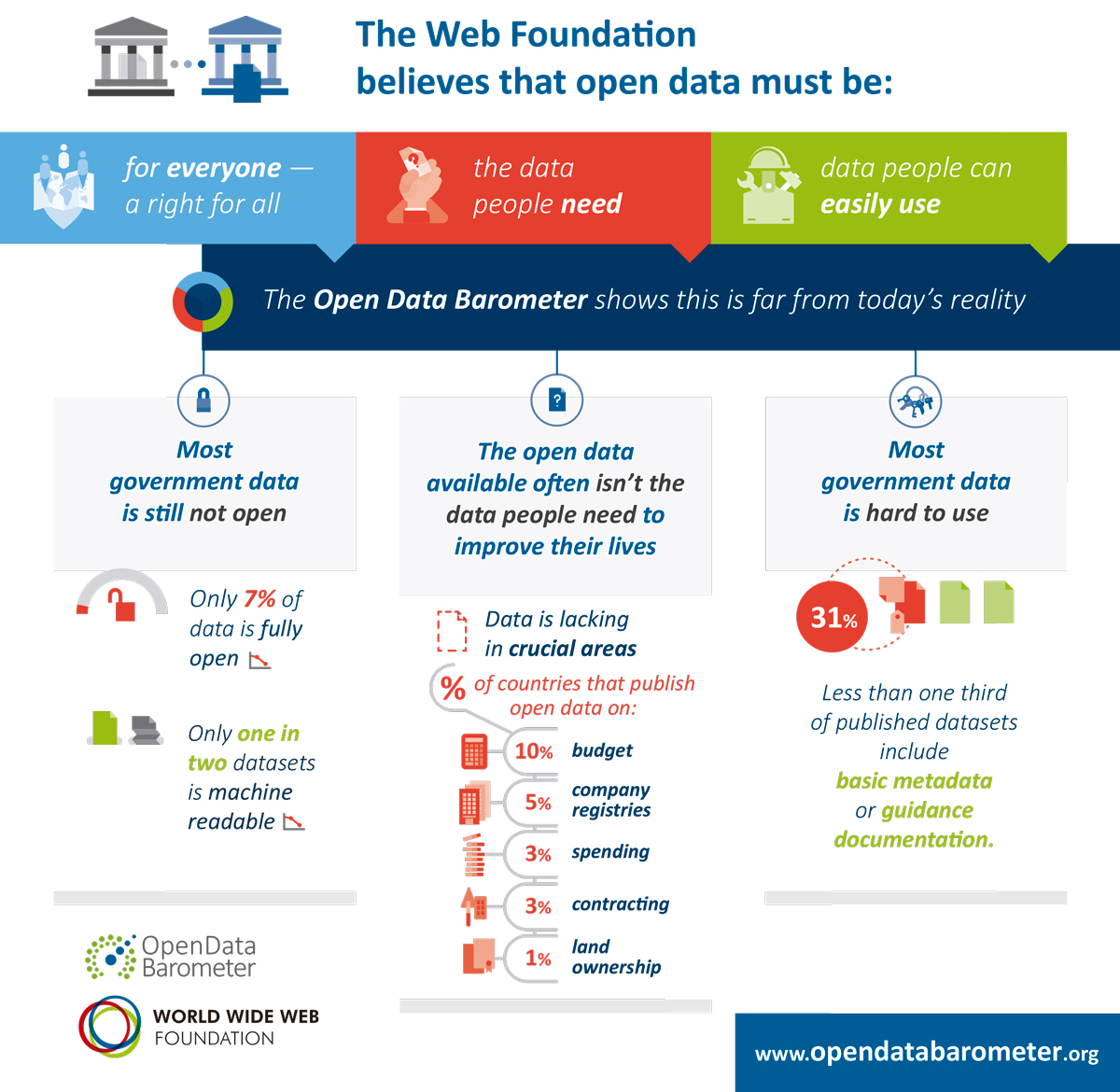
The World Wide Web Foundation
Founded by the inventor of the web, Tim Berners-Lee, the World Wide Web Foundation aims at digital equality. Through research and promotion of innovative policies and practices, this foundation works globally to ensure that the entire population can access the web and data on equal terms. The Open Data Barometer is funded by the Open Data for Development (OD4D) network and the Omidyar Network. Open Data for Development (OD4D) is a global alliance to advance the creation of open and sustainable open data ecosystems at the local level. Omidyar Network is a philanthropic investment organization that aims to create opportunities for people to improve their lives by investing in projects that catalyze economic and social change.
Full report and further information at: http://opendatabarometer.org/
The full report in Spanish can be consulted through this link or or in English here
Report also available for download (PDF)
@WebFoundation #ODBarometer #linkedopendata
The open data contribute to the political, social and economic sustainability of a country. The European Commission, aware of the value of the re-use of the public sector information for the eurozone growth, tracks regularly the state members in order to asses the progress achieved in their open data policies.
In this way, at the beginning of the year, the European Data Portal published its first report on the assessment of the maturity of the open data ecosystem: a detailed document where the results obtained by the EU28+ in 2015 are shown. Nevertheless, according to the monitoring performed by this initiative, the second edition of this study has been published, which shows the updated data from 2016 in comparison with the previous year.
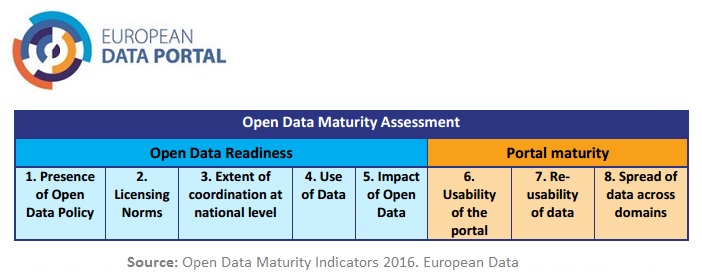
The measurement is built on two key indicators Open Data Readiness and Portal Maturity, thereby covering the level of development of national activities promoting open data as well as the level of development of national portals.
According to the document’s data, in 2016 the 31 countries assessed in this report progressed by 28.6% in comparison with the results obtained in 2015. In fact, all the nations have completed over 55% of their journey towards the openness of public sector information, showing that they have successfully developed a basic approach to address open data policies. However, significant discrepancies across countries still exist. Though some countries are still in the process of creating a national open data portal, other countries have already launched new initiatives and are redefining their multiannual strategy.
This reports has been accompanied with an interactive panel, published on the European Data Portal, which shows the results of the key performance indicators that assess the open data maturity. These KPIs include the level of development of the national open data policies, an assessment of the available characteristics in these platforms, as well as the expected impact of the open data policies.
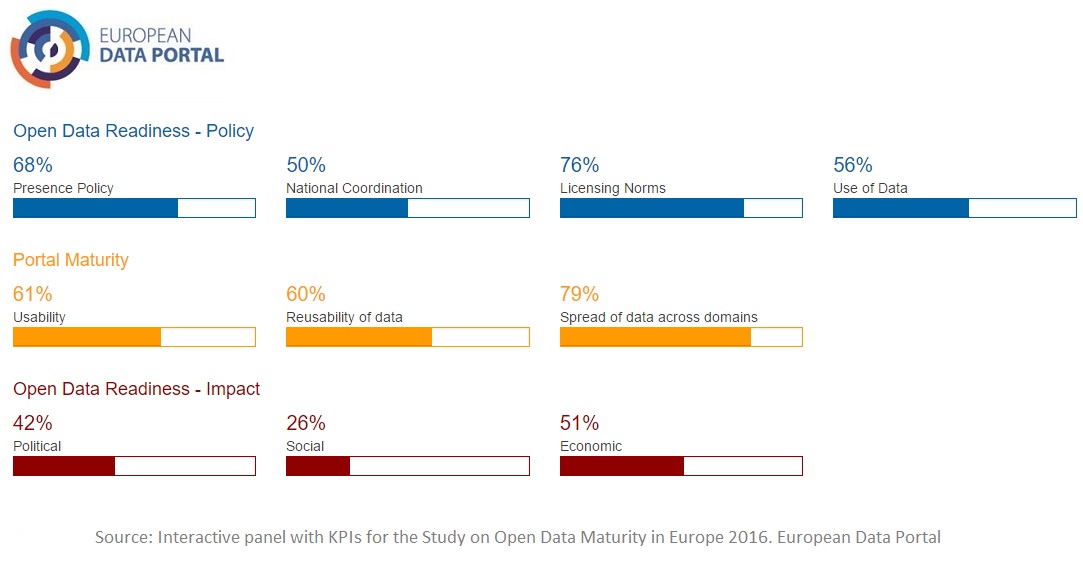
This online dashboard includes the information classified by country to help the user compare the existing differences in the openness of public data in the European Union. In this way, it is possible to create slides for each state member (together with Norway, Switzerland and Liechtenstein) to know all the details as regards their initiatives, catalogues, barriers, best practices, achievements and next steps.
Thanks to the analysis and summary done by the European programme, it is possible to know that Spain is in the first position in the EU, leading the ranking of open data maturity (as shown in the next figure), due to the high scores obtained in the different indicators: norms, policies, national coordination, portal usability, re-use or availability of the open data.
The greatest progress obtained by the country in comparison with 2015 has been the significant increase of open data impact, especially in the economic field. In fact, Spain scored the maximum of 120 points from 90 points scored in the previous year. It should be highlighted that only two countries have been identified as very ready, these are France (84.4%) and Spain (92.2%). Moreover, this last has done a great work to measure the social impact of open data, scoring the 100% of the possible points.
